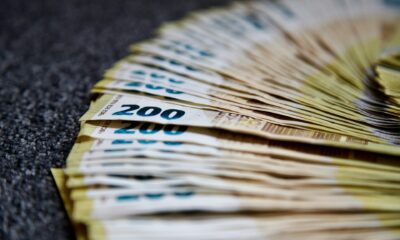Featured
Deutsche Bank brings ESG into hedging
Sustainability now also reaches currency management: The metal plant manufacturer Primetals Technologies is the first company to link the conditions of FX options to sustainability targets.The transaction is a prestigious project for Deutsche Bank. In July, the bank published a framework for sustainable financing.

The world of sustainable financial products is enriched by a new variety: The plant engineering company Primetals Technologies and Deutsche Bank have jointly developed a hedging concept that links FX hedging to sustainability goals. The first sustainability-linked transactions already took place last week, the two companies told DerTreasurer.
According to Deutsche Bank, the linking of currency options to sustainability criteria is unique in the world. One reason for this is probably the elaborate structuring of such a framework agreement. Compared to loans and promissory bills, which are now increasingly linked to ESG components, derivative transactions are much more complex. The mechanical engineering company Dürr, for example, recently linked an interest rate swap for a convertible bond to sustainability targets.
Find more about Deutsche Bank’s commitment to ESG and read the latest business headlines with our companion app Born2Invest.
How sustainability is integrated into FX options
The construct of Primetals and the Deutsche Bank works as follows: For a period of four years, the plant engineering company can conclude FX options in various currencies for the metal industry. When each individual transaction is concluded, the portal takes the ESG component into account and grants a kind of discount on individual price factors of the option transaction – such as the premium. “In simple terms, hedging is cheaper for us because we are committed to sustainability goals,” explained Jeremy Hamon, Primetals’ head of treasury, in an interview with DerTreasurer.
Once a year, the consulting firm Environmental Resource Management (ERM) checks whether Primetals has actually achieved its goals. If the plant constructor has missed them, he must pay a “penalty fee” to a non-governmental organization. The amount is fixed in advance for each hedging transaction.
The hedging transactions
Treasury departments use derivatives to hedge their companies against interest rate, currency and commodity risks. What should treasurers be aware of when entering into hedging transactions?
The fact that the money goes to an NGO and not to the bank is explained by Gerald Podobnik, Chief Financial Officer of Deutsche Bank’s Corporate Bank, as follows: “We do not want to profit from the fact that our client does not achieve its ESG goals, so we have chosen this path.”
Podobnik, who is also a member of the German government’s Sustainable Finance Advisory Council, believes that will also increase acceptance of the construct. In this way, the bank is also preventing “moral hazard” of presenting figures in a more environmentally friendly way than they are.
Deutsche Bank is committed to ESG criteria
The transaction is a prestigious project for Deutsche Bank. In July, the bank published a framework for sustainable financing. The bank now wants to fill this catalog of criteria, which is based on the EU taxonomy for sustainability, with life. For the corporate bank, this means on the one hand that its exposure in certain industries will be reduced, explains Podobnik: “We are withdrawing from coal mining, for example.
Primetals Treasury must change reporting
Primetals Technologies, which manufactures equipment especially for the metals industry, also had to invest heavily. The head of the treasury, Hamon, estimated the necessary preparatory work to take about 25 working days. “The biggest challenge was to define suitable and also ambitious sustainability targets and to align reporting accordingly.”
One of the five ESG criteria that the company has defined together with Deutsche Bank and the consultancy ERM is now including, for example, the proportion of incoming orders for “green” products. The ratio of sales to research and development expenditure for product solutions that lead to improved resource efficiency is also measured. These are now taken into account for currency management.
As a subsidiary of the Japanese heavy industry group Mitsubishi Industries, Primetals Technologies hardly takes up any financing of its own. However, the plant manufacturer is exposed to a high degree of currency risk, and the company is correspondingly active on the FX derivatives market on a regular basis: “We therefore found that FX options are a good way of driving forward and making transparent our efforts to improve our own sustainability performance.”
__
(Featured image by Hans via Pixabay)
DISCLAIMER: This article was written by a third party contributor and does not reflect the opinion of Born2Invest, its management, staff or its associates. Please review our disclaimer for more information.
This article may include forward-looking statements. These forward-looking statements generally are identified by the words “believe,” “project,” “estimate,” “become,” “plan,” “will,” and similar expressions. These forward-looking statements involve known and unknown risks as well as uncertainties, including those discussed in the following cautionary statements and elsewhere in this article and on this site. Although the Company may believe that its expectations are based on reasonable assumptions, the actual results that the Company may achieve may differ materially from any forward-looking statements, which reflect the opinions of the management of the Company only as of the date hereof. Additionally, please make sure to read these important disclosures.
First published in DerTreasurer, a third-party contributor translated and adapted the article from the original. In case of discrepancy, the original will prevail.
Although we made reasonable efforts to provide accurate translations, some parts may be incorrect. Born2Invest assumes no responsibility for errors, omissions or ambiguities in the translations provided on this website. Any person or entity relying on translated content does so at their own risk. Born2Invest is not responsible for losses caused by such reliance on the accuracy or reliability of translated information. If you wish to report an error or inaccuracy in the translation, we encourage you to contact us.

-

 Cannabis2 weeks ago
Cannabis2 weeks agoRecord-Breaking Mary Jane Fair in Berlin Highlights Cannabis Boom Amid Political Uncertainty
-

 Crypto2 days ago
Crypto2 days agoXRP vs. Litecoin: The Race for the Next Crypto ETF Heats Up
-

 Biotech2 weeks ago
Biotech2 weeks agoVytrus Biotech Marks Historic 2024 with Sustainability Milestones and 35% Revenue Growth
-

 Crypto7 days ago
Crypto7 days agoRipple Launches EVM Sidechain to Boost XRP in DeFi

























